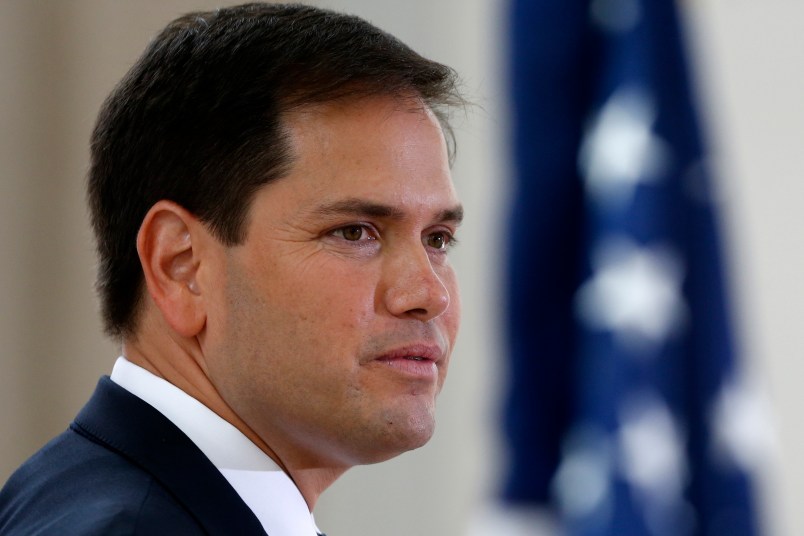Sen. Marco Rubio (R-FL) plans to introduce legislation this week to repeal a temporary piece of Obamacare he decries as a taxpayer “bailout” of insurance companies, which was designed to ensure stability in the law’s individual and small-group markets.
The bill would repeal the “risk corridors,” a temporary Obamacare program to protect insurers financially if they end up enrolling a riskier crop of patients in the law’s market exchanges. It sets up a pool of funds which insurers who enroll younger and healthier patients will pay into, and which will compensate insurers who sign up older and sicker patients.
“We need to protect taxpayers from having to bail out anyone as a consequence of ObamaCare,” Alex Conant, a spokesman for Rubio, told TPM in an email. “Rubio’s bill will fully repeal the risk corridor provision in Obamacare, preventing a bailout under the existing risk corridor provision of Obamacare.”
The program, which legislation mandates to sunset at the end of 2016, is one of several Obamacare provisions — along with a reinsurance program and risk adjustment program — aimed at combating adverse selection and prevent some insurers from spiking premiums during the first few years of the Obamacare exchanges.
“This is yet another feature of Obamacare that’s designed to minimize any disruption caused to insurance markets,” said Jon Gruber, an economist at MIT and architect of Obamacare who supports the law. “The risk corridor is pretty wide so you have to make a lot of money or lose a lots of money for it to kick in. I think repealing it would essentially add uncertainty. Insurers are conservative folks. They don’t like uncertainty. They’re going to raise their prices.”
Senate Democratic leaders are highly unlikely to bring up the bill. But Rubio’s plan serves as a clever messaging tool, giving Republicans a way to claim the populist mantle on behalf of taxpayers. The timing is also prescient: he plans to offer it on the heels of President Barack Obama’s one-year administrative fix for cancellations due to the law, which may disrupt the market in a way that makes the risk corridors provision more needed than the health care law initially envisioned.
“The President’s announcement yesterday increases the likelihood of a federal bailout of insurance companies through the ‘risk corridor’ provisions in Obamacare,” Conant said. “That’s why Senator Rubio will introduce legislation in coming days that will ensure the Obama Administration doesn’t have unaccountable blank check writing authority to bail out insurance companies at the expense of taxpayers.”
The nonpartisan Congressional Budget Office has projected that the risk corridors provision won’t cost taxpayers a dime — that money coming in from low-risk insurers would equal money paid out to high-risk insurers. But Rubio’s premise is sound in that taxpayers may be on the hook if there are major market disruptions, which Obama’s one-year fix for cancellations could potentially raise the likelihood of.
“Repeal could save money,” Dan Mendelson, a former top health official for the Clinton White House who now runs the consulting firm Avalere Health. “The risk corridors are funded by the government for plans that lose too much money. For plans that make too much money, they will make payments to HHS. There’s no requirement for the risk corridors to balance out, so it’s possible that the program would be a net cost to taxpayers if, in total, plans lose more money than they make within the program.”
But Mendelson thinks Rubio’s proposal is a bad idea. “This is a nice way to destabilize the commercial offerings in the exchanges,” he said. “It’s basically a repeal strategy.”
Gruber said Rubio was merely “trolling” Obamacare supporters. He noted that a provision similar to the risk corridors was included in Medicare Part D. “This is classic right-wing ideology,” he said. “It’s just trying to do what they can to repeal it.”
The text of the legislation hasn’t been released yet. Conant said Rubio is asking other senators to co-sponsor the bill and expects to introduce it “as soon as possible” this week.






